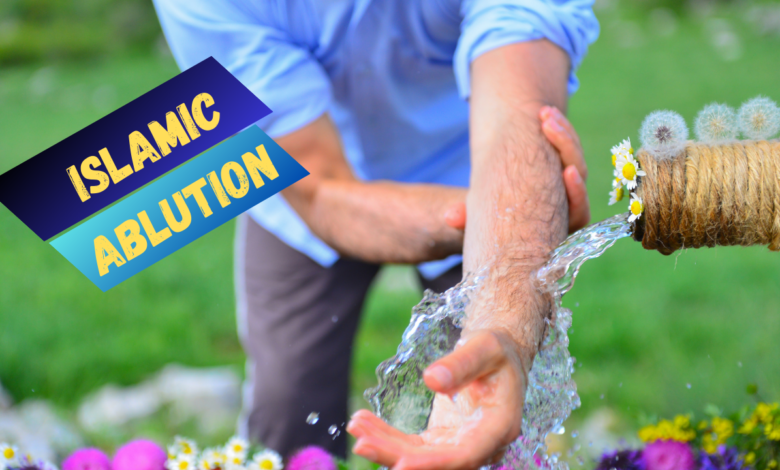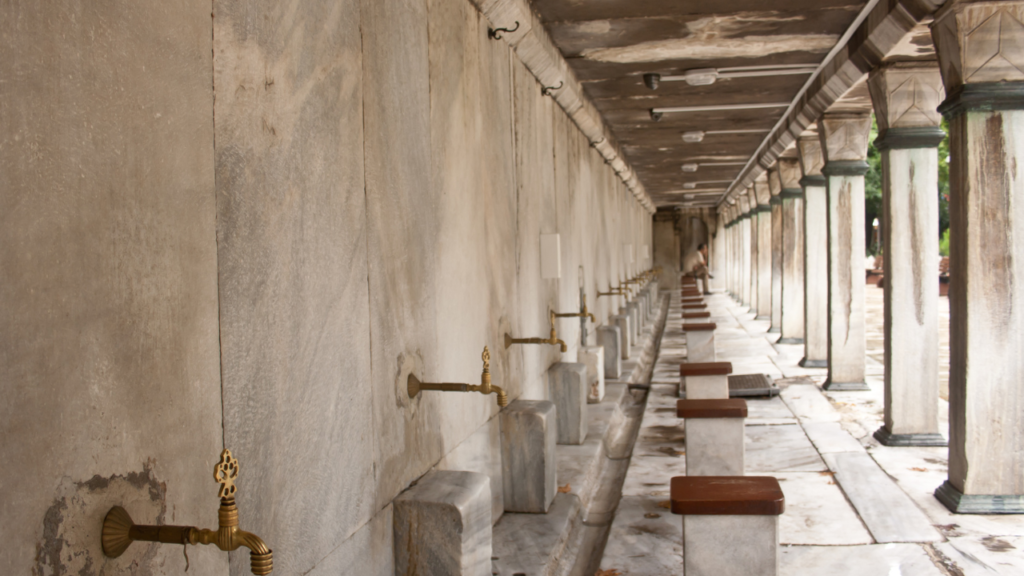
Islamic Ablution
Islamic ablution, or Wudu, is a ritual purification process performed by Muslims before their daily prayers. It involves the washing of specific body parts to spiritually cleanse oneself and become ritually pure.

Introduction
Islamic ablution, known as “Wudu” or “Wudhu” in Arabic, is a fundamental ritual in Islam. It serves as a purification process for Muslims before they engage in acts of worship, such as prayer or reading the Quran. Wudu is more than just a physical cleansing; it is a symbolic and spiritual act that connects believers with their faith and helps them attain a state of ritual purity.
The Importance of Wudu
Wudu holds a central place in Islam for several reasons:
- Spiritual purification: Wudu is believed to purify not only the body but also the soul. It is a means of spiritual cleansing that prepares the believer to stand in the presence of Allah during acts of worship.
- Ritual prerequisite: Wudu is a prerequisite for performing the daily prayers (Salat) in Islam. Without it, one’s prayer is considered incomplete and invalid. Thus, it is essential for Muslims to maintain their Wudu throughout the day.
- Symbolism: Each step of the ablution process carries symbolic significance. It reminds believers of their commitment to cleanliness, humility, and submission to the will of Allah.
The Steps of Wudu
Islamic ablution involves a specific set of steps:
- Intention (Niyyah): The process begins with a sincere intention to perform Wudu for the sake of Allah. This internal commitment is essential for the ritual’s validity.
- Washing the Hands: The process begins by washing both hands up to the wrists three times. This symbolizes the removal of impurities and worldly distractions.
- Mouth and Nose: Next, the mouth and nose are rinsed three times with water, using the right hand. This signifies purification of one’s speech and senses.
- Face: The face is washed three times, from the hairline to the chin and from ear to ear. This step represents the purification of one’s expressions and emotions.
- Arms: Each arm, starting with the right, is washed up to the elbows three times. This act signifies the dedication of one’s physical strength and actions to Allah.
- Wiping the Head: A wet hand is wiped over the head, from the forehead to the nape of the neck, once. This represents the submission of one’s thoughts and intellect to Allah.
- Wiping the Feet: Both feet are wiped with wet hands, up to the ankles, three times. This symbolizes the grounding of one’s actions and journey in faith.
- Sequence and Order: It is crucial to perform these steps in a specific sequence and without interruption for the ablution to be valid.
Also Check
- Dreams interpretation in Islam
- Islamic quotes
- Islam moon and star
- Which Hadith do Sunnis follow?
- People of the book Islam
Spiritual Benefits of Wudu
Beyond the physical and ritualistic aspects, Wudu holds spiritual benefits for Muslims:
- Increased mindfulness: Wudu requires a focused state of mind, enhancing a believer’s mindfulness and presence in their worship.
- Sense of purity: Completing Wudu imparts a feeling of spiritual purity, which can boost a Muslim’s confidence and connection with Allah.
- Preparation for prayer: Wudu serves as a transition from the secular world to the sacred realm of prayer, helping believers shift their focus entirely to worship.
- Unity and equality: Everyone, regardless of their social or economic status, performs Wudu in the same manner, emphasizing the unity and equality of all Muslims before Allah.
Conclusion
Islamic ablution, Wudu, is not merely a physical cleansing ritual but a profound spiritual practice in Islam. It symbolizes purity, humility, and submission to Allah, preparing the believer for acts of worship and connecting them with their faith. Through its prescribed steps and deep symbolism, Wudu reinforces the fundamental principles of Islam, serving as a constant reminder of the believer’s spiritual journey and their commitment to God.

(FAQs) About Islamic Ablution (Wudu)
What is Islamic ablution (Wudu)?
Islamic ablution, or Wudu, is a ritual purification process performed by Muslims before their daily prayers. It involves the washing of specific body parts to spiritually cleanse oneself and become ritually pure.
Why is Wudu important in Islam?
Wudu is important because it purifies a person both physically and spiritually, enabling them to approach Allah in a state of cleanliness and humility during their prayers. It is a fundamental part of Islamic worship.
Which body parts are washed during Wudu?
During Wudu, Muslims wash specific body parts, including the face, hands, arms, mouth, nose, feet, and wipe the head. These actions are performed in a specific sequence and with the intention of purification.
Is it necessary to perform Wudu before every prayer?
Yes, it is necessary to perform Wudu before every obligatory prayer in Islam. It is also recommended to renew Wudu before optional prayers, reading the Quran, or entering the mosque.
Are there specific conditions that nullify Wudu?
Yes, several conditions can nullify Wudu, including passing gas, using the restroom, bleeding, and falling asleep while lying down. In such cases, Muslims need to renew their Wudu before praying again.
Can a person with impurities or minor impurities perform Wudu?
A person with minor impurities, such as urine or wind, must remove these impurities before performing Wudu. Major impurities like sexual intercourse or menstruation require a full ritual bath (Ghusl) before one can perform Wudu.
Can someone perform Wudu without water?
Ideally, Wudu should be performed with water, but in cases where water is unavailable or harmful to health, Muslims can perform a dry ablution (Tayammum) using clean earth or dust.
Is there a specific prayer or supplication to recite during Wudu?
There is no specific prayer or supplication required during Wudu. However, Muslims are encouraged to make a sincere intention (Niyyah) to purify themselves for the sake of Allah.
Can non-Muslims perform Wudu?
While Wudu is primarily an Islamic practice, non-Muslims are welcome to observe and learn about it, but it is not obligatory for them. Wudu holds religious significance in Islam and is not typically practiced by non-Muslims.
What should one do if they forget whether they performed Wudu or not?
If someone forgets whether they performed Wudu or not, they should err on the side of caution and perform Wudu again, as it is better to pray in a state of certainty regarding one’s purity.






